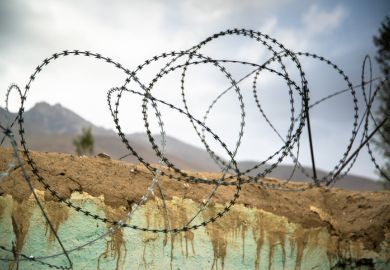The US State Department has confirmed that it is reinstating its prestigious Fulbright scholarship programme in Afghanistan, allowing semi-finalists from this year’s cancelled intake to have their applications considered in the 2023-24 cycle.
The State Department halted the Fulbright foreign scholarship programme in Afghanistan in January, citing “significant barriers impeding our ability to provide a safe exchange experience to future participants”.
The decision sparked outcry among applicants, many of whom had applied to the programme numerous times and had rejected other chances to leave Afghanistan after last year’s Taliban takeover in the hope of securing a postgraduate fellowship in the US. Roughly 140 semi-finalists were affected.
But now semi-finalists to the programme have been told that they can resume the interview and selection process, according to a letter sent to semi-finalists that was seen by Times Higher Education.
Interviews are due to take place between April and June this year. At this time, only current semi-finalists from Afghanistan will be considered.
“If you are selected as a finalist following the interview process, we intend for your Fulbright academic programme to begin in the summer or [autumn] of 2023, pending an improvement in the security situation,” write Fulbright officials.
In the interim, applicants will receive information about participating in a “micro-masters online certificate programme offered by top institutions”. These are postgraduate-level courses providing “deep learning and a recognised credential” in a “range of fields”, according to the letter.
However, the authors caution, “not all semi-finalist applicants will be selected for a Fulbright scholarship, so we strongly encourage you to continue to explore other opportunities even as the selection process resumes”.
The State Department told THE that currently “the conditions on the ground have not changed” but that “carrying forward the applications to the 2023-24 academic year provides more time to resolve the significant safety and logistical barriers that must still be overcome to again support Fulbright opportunities for Afghan students”.
Regardless, the letter has prompted celebration among students for whom recent months have been spent in fear of danger from Afghanistan’s ruling regime. Concerns have been raised that their association with the West could endanger their lives.
One semi-finalist said the good news came not long after the Taliban had conducted door-to-door searches and “wrecked everyone’s peace”.
Another student said the letter left him buoyant. “Feeling optimistic and excited for the resumption of Fulbright for Afghanistan,” wrote semi-finalist Farhat Zia Alizoy. “We appreciate everyone’s endeavours that [led] Fulbright to reconsider its previous decision.”
While it is still unclear if it will be safe for Fulbrighters to leave Afghanistan to start the programme next year, those responsible for overseeing the programme say they will keep pushing to help applicants from the country.
Fulbright board member Margaret Chai Maloney told THE: “The Fulbright board will continue to do everything we can do to try to assist Afghan Fulbrighters and try to continue the programme safely.”
Another board member, Heather Nauert, previously told THE that the decision to cancel the Fulbright programme in Afghanistan was taken by the State Department over the head of the Fulbright board.
Register to continue
Why register?
- Registration is free and only takes a moment
- Once registered, you can read 3 articles a month
- Sign up for our newsletter
Subscribe
Or subscribe for unlimited access to:
- Unlimited access to news, views, insights & reviews
- Digital editions
- Digital access to THE’s university and college rankings analysis
Already registered or a current subscriber? Login








